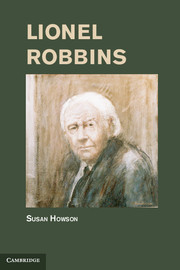Book contents
- Frontmatter
- Contents
- Illustrations
- Abbreviations
- Introduction
- One Father and Son
- Two The Great War
- Three Postwar
- Four The London School of Economics
- Five Iris Gardiner
- Six New College Oxford
- Seven The Young Professor
- Eight Fritz and Lionel
- Nine The School in the Mid-1930s
- Ten The Approach of War
- Eleven The Economics of War
- Twelve Director of the Economic Section
- Thirteen Anglo-American Conversations
- Fourteen The Law Mission and the Steering Committee
- Fifteen 1 9 4 4
- Sixteen The Last Months of the War
- Seventeen The Postwar Settlement
- Eighteen Return to the School
- Nineteen The End of the Transition
- Twenty LSE in the Early 1950s
- Twenty-One Chairman of the National Gallery
- Twenty-two Lord Robbins
- Twenty-three The Robbins Report
- Twenty-four The Sixties
- Twenty-five The Arts
- Twenty-six The Troubles at LSE
- Twenty-seven Retirement
- Conclusion
- Bibliography
- Index
Conclusion
Published online by Cambridge University Press: 07 October 2011
- Frontmatter
- Contents
- Illustrations
- Abbreviations
- Introduction
- One Father and Son
- Two The Great War
- Three Postwar
- Four The London School of Economics
- Five Iris Gardiner
- Six New College Oxford
- Seven The Young Professor
- Eight Fritz and Lionel
- Nine The School in the Mid-1930s
- Ten The Approach of War
- Eleven The Economics of War
- Twelve Director of the Economic Section
- Thirteen Anglo-American Conversations
- Fourteen The Law Mission and the Steering Committee
- Fifteen 1 9 4 4
- Sixteen The Last Months of the War
- Seventeen The Postwar Settlement
- Eighteen Return to the School
- Nineteen The End of the Transition
- Twenty LSE in the Early 1950s
- Twenty-One Chairman of the National Gallery
- Twenty-two Lord Robbins
- Twenty-three The Robbins Report
- Twenty-four The Sixties
- Twenty-five The Arts
- Twenty-six The Troubles at LSE
- Twenty-seven Retirement
- Conclusion
- Bibliography
- Index
Summary
I have tried to tell the story of Lionel Robbins’s life ‘as it happened’, with due regard to the fact that he was often engaged in several different activities at the same time. It is time to step back to look at what he accomplished in his varied life and what enabled him to do so.
Although Robbins’s early ambitions did not include the life of an academic economist, it is that life for which he is most remembered. The route by which he became one was not straight, originating in his youthful attachment to guild socialism and the challenge to those ideas of Major Douglas’s social credit proposals. When he resumed his university education in 1920, after active service in the First World War and eighteen months working for the labour movement, he chose to study at the London School of Economics instead of returning to the study of literature. There he pursued his interests in political theory and the history of political ideas throughout his three years as an undergraduate. But he also encountered the academic discipline of economics, which attracted him because it was rational and scientific: its findings were not dictated by political presumptions and it was value-free compared with political science. When he came to criticize leftleaning economists for using an assumption of diminishing marginal utility of income to derive arguments for redistributive policies, his objection was not to the policies as such but to the claim that they were justified by economic theory, when the justification was in fact the unprovable and unscientific ‘law of diminishing marginal utility’. The emphasis on rationality was also a long way from the philosophy of Nietzsche and from ‘the queer mixture of practical politics and irrational enthusiasm which goes by the name of socialism’ (see Chapter 4), both of which had attracted him in his youth.
- Type
- Chapter
- Information
- Lionel Robbins , pp. 1079 - 1090Publisher: Cambridge University PressPrint publication year: 2011



